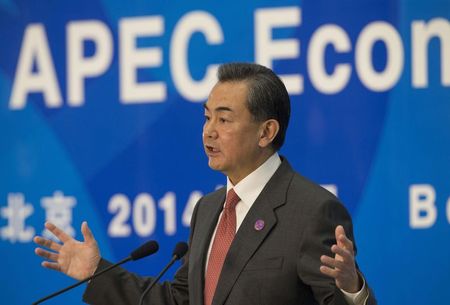BEIJING (Reuters) - Iran and six world powers will "eventually reach" a pact to resolve a 12-year stand-off over Tehran's nuclear ambitions, even if talks may have to be postponed over many complex issues, China's foreign minister said on Monday.
Britain, China, France, Germany, Russia and the United States began the final round of talks with Iran on Tuesday to clinch a pact by which Tehran would curb its nuclear work in exchange for a lifting of economically crippling sanctions.
The countries looked set to miss Monday's deadline for resolving the stand-off and are already looking at a possible extension of the negotiations.
An agreement was still possible on Monday, however, China's Foreign Minister Wang Yi said in a statement on the ministry's website.
Wang, who arrived in Vienna on Monday, also cautioned the countries might have to discuss whether to postpone the talks due to "a large number of professional and technical issues that still require careful and complex discussion".
He added, "I think the parties, including Iran, have the political will to reach an agreement. Through concerted efforts by the parties, (we) will eventually reach an agreement to resolve the Iranian nuclear issue."
China "hopes to push for a comprehensive agreement on the Iranian nuclear issue that will be in line with the interests of Iran and the international community," Wang told his Iranian counterpart Mohammad Javad Zarif, the ministry said in a separate statement.
A European official said the possibility of securing a final agreement "seems physically impossible", echoing comments by Iranian officials.
German Foreign Minister Frank Walter-Steinmeier spoke of a deep divide between Iran and the six powers, saying they were "still far apart on many issues".
The talks aim to end Western suspicions that Iran seeks a nuclear bomb capability, while allowing Iran to have the civilian nuclear programme it says is its right under international rules. Tehran denies seeking nuclear weapons.

Tehran blames the West for the deadlock, saying it has consistently made unreasonable demands of Iran.
(Reporting by Sui-Lee Wee; Editing by Clarence Fernandez)